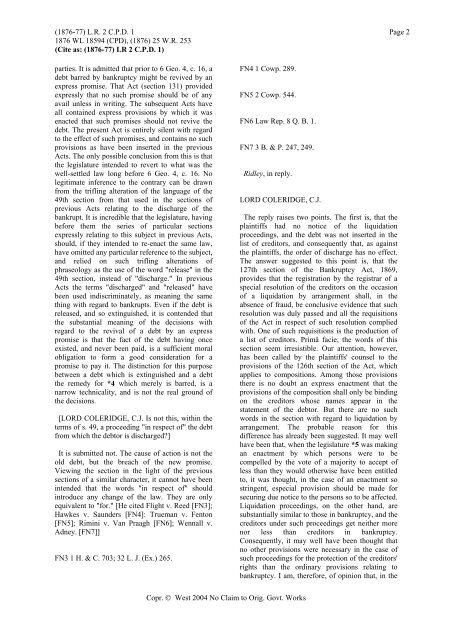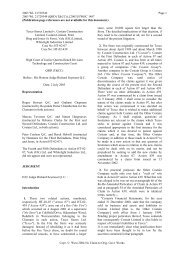In Re Bonacina Le Brasseur v Bonacina - Thomson Reuters
In Re Bonacina Le Brasseur v Bonacina - Thomson Reuters
In Re Bonacina Le Brasseur v Bonacina - Thomson Reuters
Create successful ePaper yourself
Turn your PDF publications into a flip-book with our unique Google optimized e-Paper software.
(1876-77) L.R. 2 C.P.D. 1 Page 21876 WL 18594 (CPD), (1876) 25 W.R. 253(Cite as: (1876-77) LR 2 C.P.D. 1)parties. It is admitted that prior to 6 Geo. 4, c. 16, adebt barred by bankruptcy might be revived by anexpress promise. That Act (section 131) providedexpressly that no such promise should be of anyavail unless in writing. The subsequent Acts haveall contained express provisions by which it wasenacted that such promises should not revive thedebt. The present Act is entirely silent with regardto the effect of such promises, and contains no suchprovisions as have been inserted in the previousActs. The only possible conclusion from this is thatthe legislature intended to revert to what was thewell-settled law long before 6 Geo. 4, c. 16. Nolegitimate inference to the contrary can be drawnfrom the trifling alteration of the language of the49th section from that used in the sections ofprevious Acts relating to the discharge of thebankrupt. It is incredible that the legislature, havingbefore them the series of particular sectionsexpressly relating to this subject in previous Acts,should, if they intended to re-enact the same law,have omitted any particular reference to the subject,and relied on such trifling alterations ofphraseology as the use of the word "release" in the49th section, instead of "discharge." <strong>In</strong> previousActs the terms "discharged" and "released" havebeen used indiscriminately, as meaning the samething with regard to bankrupts. Even if the debt isreleased, and so extinguished, it is contended thatthe substantial meaning of the decisions withregard to the revival of a debt by an expresspromise is that the fact of the debt having onceexisted, and never been paid, is a sufficient moralobligation to form a good consideration for apromise to pay it. The distinction for this purposebetween a debt which is extinguished and a debtthe remedy for *4 which merely is barred, is anarrow technicality, and is not the real ground ofthe decisions.[LORD COLERIDGE, C.J. Is not this, within theterms of s. 49, a proceeding "in respect of" the debtfrom which the debtor is discharged?]It is submitted not. The cause of action is not theold debt, but the breach of the new promise.Viewing the section in the light of the previoussections of a similar character, it cannot have beenintended that the words "in respect of" shouldintroduce any change of the law. They are onlyequivalent to "for." [He cited Flight v. <strong>Re</strong>ed [FN3];Hawkes v. Saunders [FN4]: Trueman v. Fenton[FN5]; Rimini v. Van Praagh [FN6]; Wennall v.Adney. [FN7]]FN3 1 H. & C. 703; 32 L. J. (Ex.) 265.FN4 1 Cowp. 289.FN5 2 Cowp. 544.FN6 Law <strong>Re</strong>p. 8 Q. B. 1.FN7 3 B. & P. 247, 249.Ridley, in reply.LORD COLERIDGE, C.J.The reply raises two points. The first is, that theplaintiffs had no notice of the liquidationproceedings, and the debt was not inserted in thelist of creditors, and consequently that, as againstthe plaintiffs, the order of discharge has no effect.The answer suggested to this point is, that the127th section of the Bankruptcy Act, 1869,provides that the registration by the registrar of aspecial resolution of the creditors on the occasionof a liquidation by arrangement shall, in theabsence of fraud, be conclusive evidence that suchresolution was duly passed and all the requisitionsof the Act in respect of such resolution compliedwith. One of such requisitions is the production ofa list of creditors. Primâ facie, the words of thissection seem irresistible. Our attention, however,has been called by the plaintiffs' counsel to theprovisions of the 126th section of the Act, whichapplies to compositions. Among those provisionsthere is no doubt an express enactment that theprovisions of the composition shall only be bindingon the creditors whose names appear in thestatement of the debtor. But there are no suchwords in the section with regard to liquidation byarrangement. The probable reason for thisdifference has already been suggested. It may wellhave been that, when the legislature *5 was makingan enactment by which persons were to becompelled by the vote of a majority to accept ofless than they would otherwise have been entitledto, it was thought, in the case of an enactment sostringent, especial provision should be made forsecuring due notice to the persons so to be affected.Liquidation proceedings, on the other hand, aresubstantially similar to those in bankruptcy, and thecreditors under such proceedings get neither morenor less than creditors in bankruptcy.Consequently, it may well have been thought thatno other provisions were necessary in the case ofsuch proceedings for the protection of the creditors'rights than the ordinary provisions relating tobankruptcy. I am, therefore, of opinion that, in theCopr. © West 2004 No Claim to Orig. Govt. Works
















